How Banana Farmer Is Reaping From Mulching In Logiri Sub-County
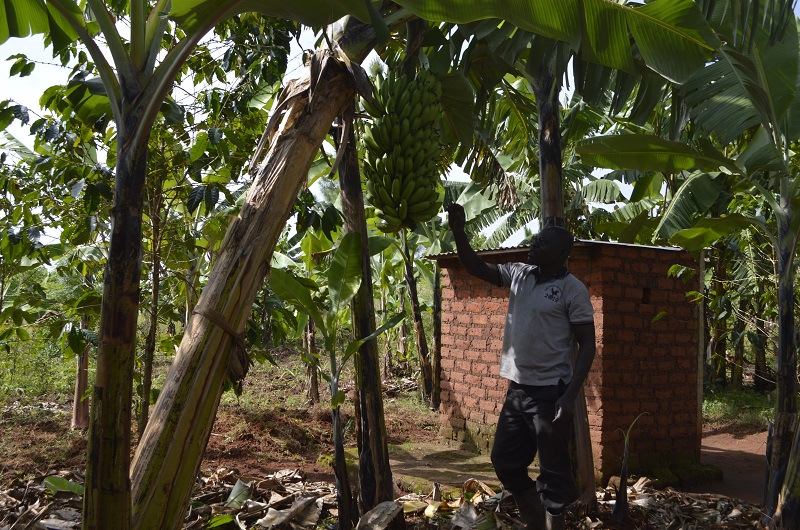
Ondoma checks a bunch of banana in his farm. Photo Credit Andrew Cohen Amvesi
ARUA.
Organic mulching is a practice often overlooked by farmers who are still stuck in traditional agriculture. However, for Kefa Ondoma, 47, a banana farmer in Arua district, mulching has helped him not to feel the impact of climate change which is taking a toll on banana farming in the area.
Ondoma mulches using grass and leaves from the same bananas in the plantation. It is now ten years that he has continued to register high yields of bananas in his farm as a result of embracing climate smart agriculture.
His farm is an outlay of a neat estate of clean stock of green bananas in well covered gardens.
In an interview with this reporter on Saturday, November 23, 2024, Ondoma said he uses the banana leaves and cuttings during pruning plus grass as mulching materials in his 10-acres banana field.
He noted that employing mulching has helped to keep his fields dump through moisture conservation and constant renewal of nutrients. This has allowed him to harvest bigger bunches of bananas compared to those days when he used not to embrace the practice.
The approach has earned the farmer commendation from Dickson Egama, the Soil Fertility Technician at NARO Abi Zonal Agricultural Research and Development Institute (ZARDI), who said mulching is a material intensive practice as it requires a lot of grass to cover a small area that a farmer should use material from the same field.
“That means the material that is used for mulching is generated within the farm because if you are to buy this material, it is very expensive. That is why we encourage farmers to plant vetiver grass whether being on the boundaries of the farm or on top of the contours. If you want to plant vetiver grass for mulching, you do one meter from the first row to the second row and then you plant it at a spacing of 10cm on a single row,” Egama advised.
He said after a period of like six to eight months, one would have enough mulch material to use in the field.
That is the first phase, but then in the second phase, it is going to be ready for cutting in four months’ time. Then subsequently, after every four months, you can be cutting the grass for mulching. That provides a more reliable mulch material source.
Egama observed that the key aspect of mulching is that whoever is doing it should not incorporate the mulch material with the soil.
“If you are planting crops, we don’t expect you to incorporate mulching when the crop is growing because at this stage the crop requires nitrogen but when you are going to incorporate the mulch material, it is also going to require nitrogen for its decomposition. So, in that process it is going to immobilize the nitrogen and the nitrogen will not be enough for the crops,” Egama advised.
Ondoma said he started using mulching in his farm 10 years ago in order to keep the soil fertile. Covering the soil with the mulch material also helps him to control the growth of weeds.
He added: “Mulching even controls soil erosion when rain water comes trying to wash away the soil, it will stop such water from taking away the soil. Besides, mulching retains water in the field (moisture) for a long period of time for crops to benefit during the dry season,” Ondoma explained.
With the enormous benefits of mulching, he now harvests at least 50 bunches of bananas every week and sells each bunch at UGX.10,000 on average thus making at least UGX.500,000 per week.
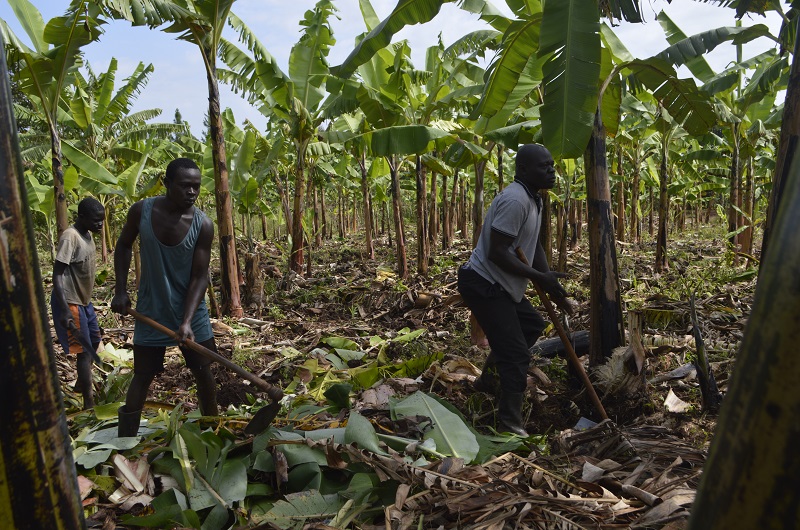
Marketing
Ondoma says the market for his bananas is readily available in Arua city with his main clients being hotels which pay him cash on delivery.
Other clients go upto the home to buy at farmgate price which is slightly lower than the market price.
He says his main source of labour is his family members but when children are in school, he hires some women to come and do casual labor to fill the gap.
“I’m using family labour and mostly my children; you can even see they are here working. I have two other male workers I have employed here; I pay them UGX.100,000 each month, but where they are overwhelmed especially when my children are in school, I encourage women to come and do casual work here and I pay them UGX.5,000 each per day to also go and support their homes,” Ondoma narrated.
Ondoma has six children of which the first born has finished his Diploma in Agriculture while the second born who happens to be a girl is still pursuing her Certificate in Agriculture.
The third child has just completed senior four this year and the fourth one is in primary six, all being paid by the proceeds from the banana farm.
“I’m paying the school fees of all these children using the money I get from the sale of bananas. I also plant cassava, maize and beans among other crops but my main focus is on bananas because it is what brings for me money, other crops are for food. Food is not a problem at my home at all and that is why you can see all my children are healthy,” Ondoma said.
Besides mulching, Ondoma has embraced contours and planted vetiver grass to retain water in the farm. He also does irrigation using the water facility donated and constructed for him by the district through the sub-county authority.
“I have undergone several trainings organized by the sub-county and nongovernmental organizations (NGOs). I usually practice what I have learnt on my farm. I also train farmers in my neighborhood to engage in the good farming practices I’m undertaking. Many have picked up and they are right now doing very well. Their lives have greatly changed because they are getting some good money also,” Ondoma explained.
His farming practice has been an inspiration to many including his third born son who is aiming to spend a lot more time on the farm during the S.4 vacation.
Francis Yiki who has an ambition of becoming an Engineer promised not to leave farming besides his professional work in future.
“I feel so good about my father. What he is doing is so impressive that many people have come here to see what he is doing and me too. I have involved myself in doing farm work with him so that when he gets tired or old, I can inherit the work from him,” Yiki stated.
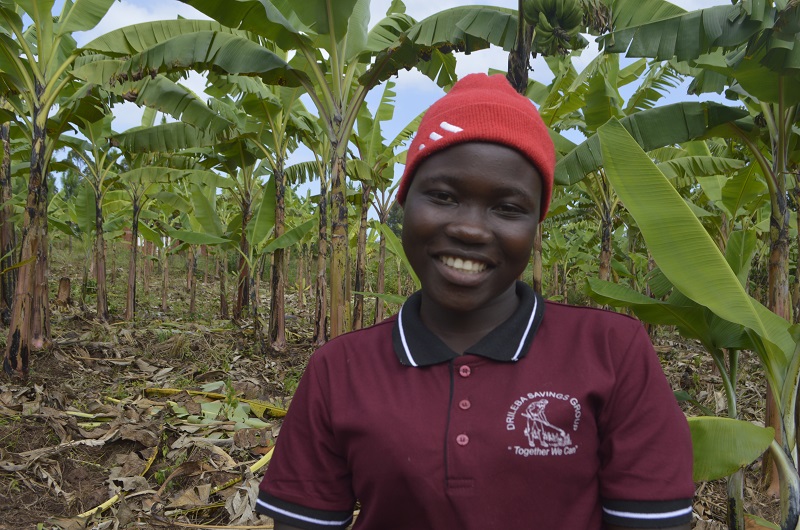
Joyce Ayikoru, 20, a mother of one who dropped out of school while in P.7 in 2020, is now earning a living by cooking food for Ondoma’s workers to support her child.
Ayikoru says Ondoma pays her UGX.5000 per day and she uses the money for buying soap, jelly and milk for her child.
“Life became hard as soon as I gave birth but when I came to ask for work here, Mr Ondoma welcomed me. For the one year I have been working here, my life has improved because I can now afford to eat from his home, use the money he pays me for buying soap, jelly and milk for my child. I also used part of the money I saved to buy three goats which will soon multiply,” excited Ayikoru narrated.
Rose Atizuyo, another mother of six, working in Ondoma’s farm says buying scholastic materials like books, pens and pencils including clothes for her children has been made easy because of the financial benefit she gets from the farm.
Fabiano Abetia, a banana farmer in the neighborhood, said they have been moving to learn several good farming practices from Ondoma’s farm which he has now replicated in his farm.
“I have been going to see what Ondoma does in his farm and indeed I learnt a lot from his practices. Now in my farm here, I do practice mulching under my bananas, contour ploughing except irrigation because I don’t have the equipment yet. Within these four years of adopting the practices, my banana yield has greatly improved and now I get on average UGX.3.5m in a year from the sale of my bananas compared to UGX.1.5m I used to get before engaging in these good agricultural practices,” Abetia confessed.
Challenges
Ondoma, however, says his main challenge is lack of power which has made it hard for him to add value to the bananas he is producing from the farm.
“If the government could extend electricity to our area here, I would use it for doing value addition on the bananas I’m producing. I would process the bananas, package and take them to outside countries like DR Congo or even America,” Ondoma remarked.
He plans to expand the farm, do value addition and also have his own means of transport in the form of a truck for ferrying his bananas to the market.
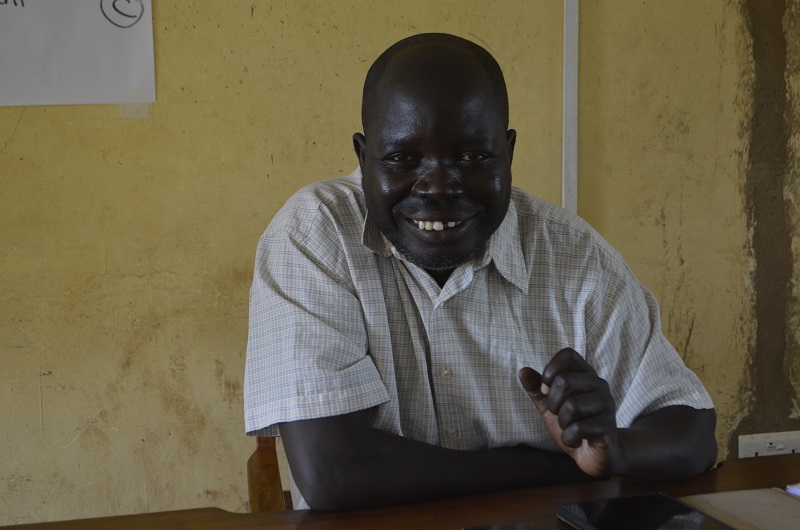
When contacted, David Atiku, the Logiri sub-county Agricultural Extension worker who doubles as the acting Logiri sub-county Production Officer, said they provide continuous extension services for their farmers like Ondoma Kefa and also help them to upscale technologies with support from the National Agricultural Research Organization (NARO).
“In other words when new improved seed varieties reach us, we use such farmers to upscale and expand the technologies available under NARO; say sweet potato production, bananas, cassava, soya beans and beans among others, all these new varieties, we use such farmers to have trial plots and thereafter we call farmers so that they can be able to choose what can do better for them,” Atiku said.
He said as a government, they are taking soil and water conservation as a priority to mitigate the effects of climate change.
“We need to embark on soil and water conservation methods. Of course, some of them are mulching, the contours, Fanya ju – Fanya chini, irrigation, line/row planting among others. We have acquired Vetiver grass from NARO and we are able to expand this within the communities. As we talk now, we are able to conserve water and soil with the help of vetiver grass in about 57 acres in Logiri sub-county,” Atiku said, adding that most of their demonstration farms now have vetiver grass.
He said with the continued training on good agricultural practices, about 30 percent of the farmers in Logiri sub-county practice mulching, 10 percent do irrigation, 20 percent practice contour ploughing, 35 percent practice line/row planting while 5 percent of them are involved in other practices.
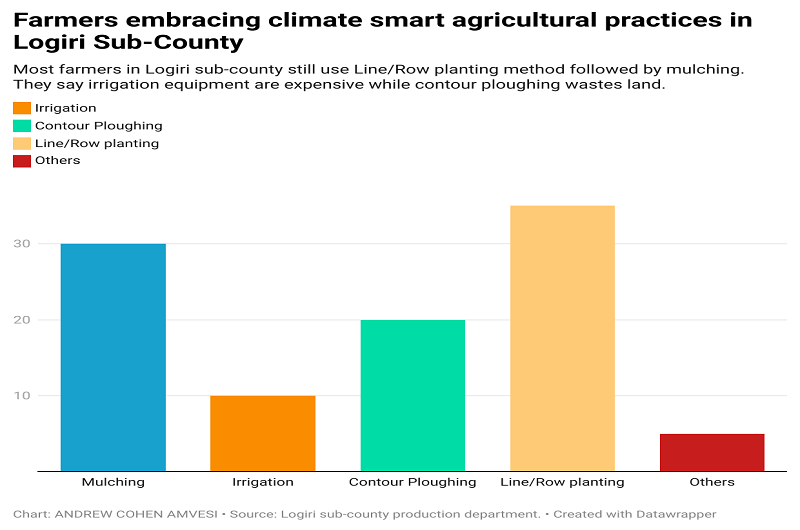
Alfred Okuonzi, the Arua district chairperson, said as a district, they are very happy about the progress Kefa Ondoma is making with other model farmers in the district.
“To me, we refer to them as progressive farmers. They are already doing well; they are progressing very well as we see lots of changes. Now we are in the times of value addition, that means everything they do, there must be value added. As a district, we provided him (Ondoma) with a micro-irrigation scheme which is helping him to grow his crops throughout the year and we have also gone ahead to add for him a tractor for bringing his produce from the garden to home and also to the market and also help other farmers in ploughing their land,” Okuonzi said.
On the power challenge, Okuonzi assured Ondoma that they are already pushing the government to take electricity to his area.
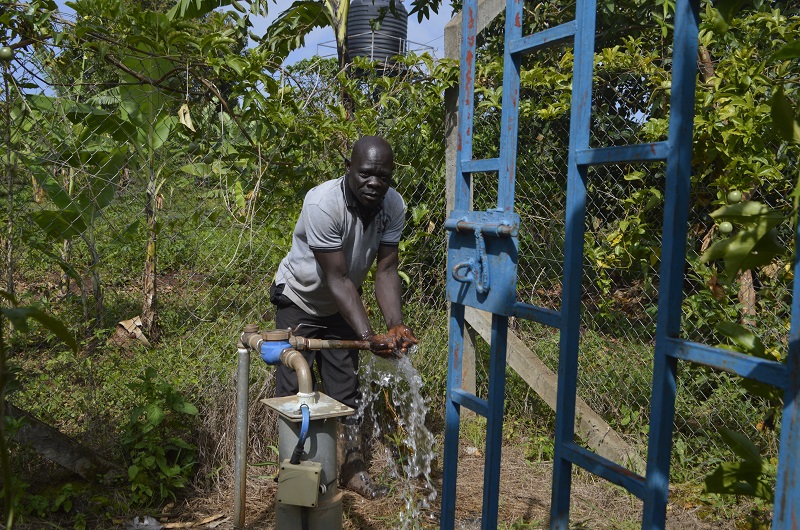
“You see that line is like a neglected line, it is on a 23km road stretch which doesn’t have a powerline at all. We have proposed this to the Ministry of Energy and Mineral Development so that power can be taken along that line stretching from Ambala – Anju – Nyio – Logiri to Opia and it is on our priority. Results have come positively as we continue putting pressure on that side but we are just waiting for the ministry to send for us a contractor to start the work,” Okuonzi promised.
Meanwhile Annet Lekuru, the Executive Director of Feminature, an NGO promoting climate smart agriculture in West Nile, said they support farmers like Ondoma through trainings, learning exchanges, provide them with farm inputs and also link them to financial institutions to increase access to capital so as to scale up the activities they are undertaking on their farms.